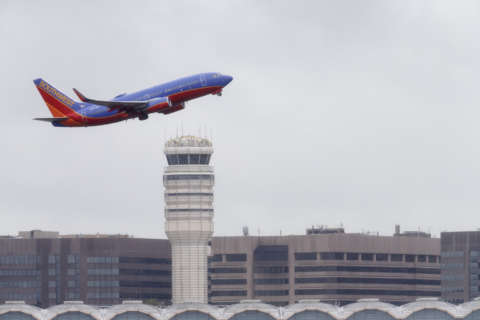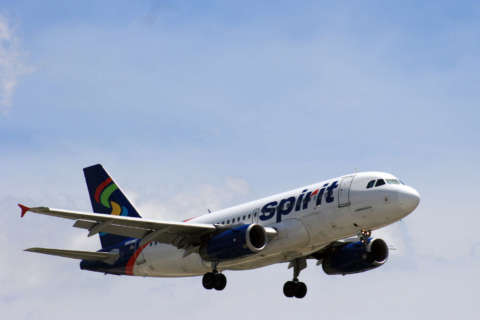WASHINGTON — Maryland Gov. Larry Hogan is calling on Attorney General Brian Frosh to sue the Federal Aviation Administration over airport noise.
In a letter to Frosh Tuesday, Hogan said he’s heard from “countless Marylanders” about how aircraft noise at BWI-Marshall Airport and Reagan National Airport have made residents “miserable in their own homes with louder and more frequent flights which now rattle windows and doors.”
Hogan cited the implementation of the FAA’s Next Generation Air Transportation System (NextGen) as the cause of added noise and pollution and said, “As elected leaders of this state, we cannot allow this situation to stand.” Hogan further said that notice from the FAA to Maryland and the affected jurisdictions was “inadequate.”
The complaints Hogan cited echo those lodged by Montgomery County residents in neighborhoods in Potomac and Bethesda who appealed to local leaders — including County Council President Roger Berliner — in September of last year.
Janelle Wright, a Potomac resident and co-chair of the policy committee for the Montgomery County Quiet Skies Coalition, said she noticed a marked change in the noise and pattern of air traffic above her house last summer. Wright said her home is in the path of arrivals and departures and she hears jets roughly every three minutes at some points of the day.
“You can’t sit on the deck,“ she said, but was more disturbed by the fact that there is no room in the house where the approaching and departing planes can’t be heard. She said when she bought her home in 2014, air traffic was barely noticeable, but now, “I’ve been robbed of the enjoyment of my home.”
Berliner, whose district includes some of the dozens of communities affected by the aircraft noise in Bethesda and Potomac, said Tuesday he commended Hogan for directing Frosh to consider suing the FAA. Berliner agreed with Hogan’s assessment that the FAA failed to adequately notify residents of the changes included in the NextGen plan and called the move towards legal action “a significant step forward.”
Frosh’s office issued a statement saying that the office “has been in conversations with both the Hogan administration and the FAA to address the issue.”
In October 2016, in response to complaints by Montgomery County residents, David Mould, vice president for communications with the Metropolitan Washington Airports Authority told a county council work session that the narrow pathway created by changes to air traffic at Reagan National created a center line of air traffic, and said, “If you are living under that center line, you are getting hammered!”
In June of this year, Montgomery County officials set aside up to $7,500 to hire a law firm to investigate a legal challenge to the FAA’s decision to implement NextGen. Part of what’s being examined is whether the FAA analyzed the environmental impacts of the changes it instituted.
In his letter to Frosh, Hogan wrote that the U.S. Court of Appeals for the D.C. Circuit had ruled in favor of Phoenix, Arizona, finding that the FAA’s approval of new flight patterns under NextGen were “arbitrary and capricious.” Phoenix Mayor Greg Stanton said of the ruling that the decision affirms that “The FAA needs to go back to the drawing board and do this right.”
Tammy Jones, with the FAA Office of Communications, said in a statement to WTOP that “The FAA is committed to hearing the communities’ concerns.” In an Aug. 3 letter to Hogan, FAA Administrator Michael Huerta wrote that some of the changes at the FAA, including NextGen, were part of a directive from Congress to modernize air traffic operations.
In that same letter, Huerta wrote that the FAA is researching how aircraft noise is being measured, and that the FAA’s data regarding aircraft altitude “doesn’t correlate with community perception.”








